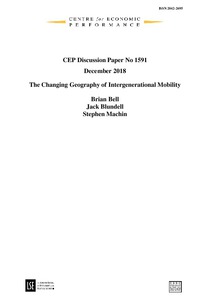The changing geography of intergenerational mobility
"Does the importance of your family background on how far you get in adulthood also depend on where you grow up? For many countries, Britain included, a paucity of data has made this a question with very little reliable evidence to answer. To redress this evidence lacuna, we present a new analy...
| Main Authors: | , , |
|---|---|
| Institution: | ETUI-European Trade Union Institute |
| Format: | TEXT |
| Language: | English |
| Published: |
London
2018
LSE |
| Subjects: | |
| Online Access: | https://www.labourline.org/KENTIKA-19306224124911244069-The-changing-geography-of-inte.htm |
| Summary: | "Does the importance of your family background on how far you get in adulthood also depend on where you grow up? For many countries, Britain included, a paucity of data has made this a question with very little reliable evidence to answer. To redress this evidence lacuna, we present a new analysis of intergenerational mobility across three cohorts in England and Wales using linked decennial census microdata. As well as testing the robustness of existing survey evidence on mobility trends over time, this large dataset permits analysis to be undertaken at a more geographically disaggregated level than was previously feasible. Evidence is presented on occupational wages, home ownership and education. Our new analysis shows a slight decline in occupation-wage mobility and a substantial decline in home ownership mobility over the late 20th century in England and Wales, while the picture for educational mobility is less clear. Focusing on the most recent cohort, we find marked geographic differences in mobility. We find that occupation-wage mobility is exceptionally high in London, while ex-industrial and mining areas experience the lowest rates of mobility. Areas with low occupation-wage mobility were more likely to vote to leave the European Union in the 2016 referendum. Home ownership mobility is negatively correlated with house prices and not correlated with occupation-wage mobility, suggesting that geographical comparisons based on one dimension of mobility need not always align with those based on alternative measures. " |
|---|---|
| Physical Description: | 47 p. Digital |

